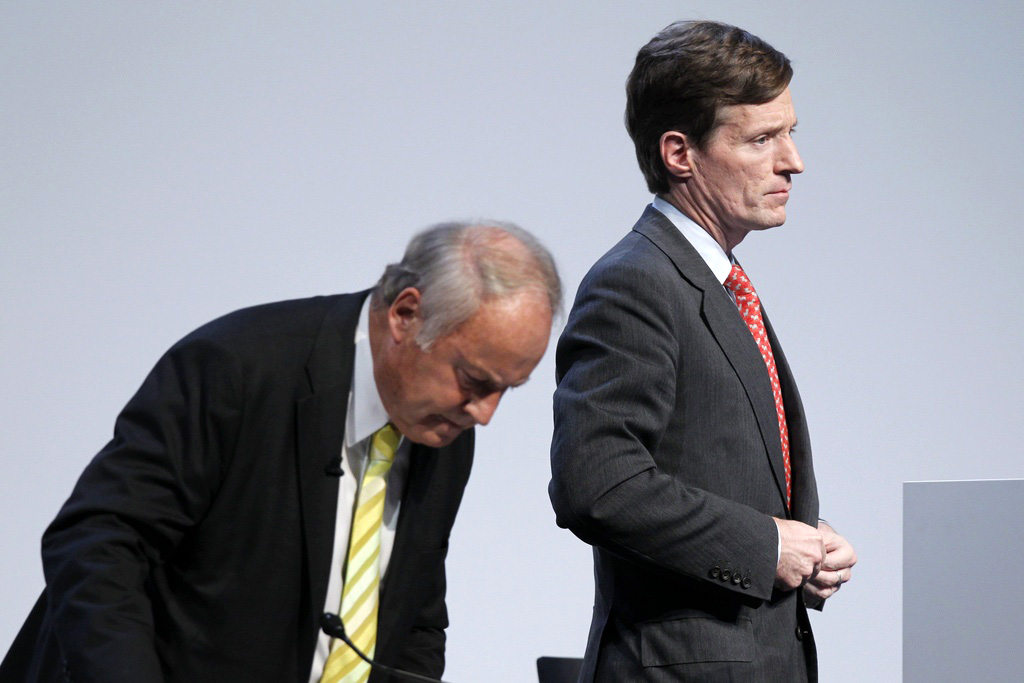Executive bother as shareholders rattle cage

Shareholders worldwide are taking advantage of greater legal powers to shout louder about the way firms are run, changing their relationship with company managers.
In many cases, enhanced shareholder activism can help force healthy changes in boardroom pay and company strategy. But it can also put shareholders on a collision course with managers or even between different groups of investors.
There have been many instances of Swiss companies feeling the full force of the changing environment since the financial crisis wiped out profits, dividends and a large proportion of share value.
UBS executives felt the full force of shareholder discontent following the subprime meltdown, while numerous large firms have started to formally consult investors on bonuses.
“There has been a big upsurge in shareholder activism after the financial crisis because they have realised that executives are no longer trustworthy,” finance specialist Arturo Bris, of the IMD business school, told swissinfo.ch.
Regulatory changes have empowered shareholders to exert more pressure on company executives, Bris added.
Important milestones
In Switzerland, important regulatory changes were enacted just before the crisis when companies were riding high on spiraling profits.
Changes to the laws concerning corporate governance in 2007, and a set of self-regulatory guidelines introduced five years earlier, forced greater transparency on firms.
“The consequence of the financial crisis was a loss of an important amount of value that put boardrooms under enormous pressure to put things right,” Vinzenz Mathys, a spokesman for campaigning pension investor Ethos told swissinfo.ch.
“But the more important milestone was the earlier change in regulations that forced companies to become more transparent. Without transparency, shareholders cannot do anything.”
Ethos, and other shareholder activists such as Actares, were behind the move to force big companies to give investors a consultative vote on bonuses.
They are also vocal about other issues, from Credit Suisse’s issuance of contingent convertible bonds to meet new capital reserve requirements to agrochemicals company Syngenta’s use of the controversial herbicide Paraquat.
Political indecision
But shareholder activism still has some way to go, according to Mathys. “Only half of shareholders actually exercise their vote. More shareholders need to realise that voting on remuneration, capital increases, acquisitions or elections to the board has an economic value and can influence returns on their investments.”
For some people, shareholders still do not hold enough power in Switzerland. Businessman Thomas Minder launched a popular initiative in 2008 to give shareholders a right to veto excessive pay, but it has become bogged down in parliament.
Politicians are also discussing proposals to update corporate governance laws to give shareholders a greater say.
But while politicians debate, the corporate world is moving on. The increasing interest of hedge funds and private equity firms in companies means that they too have homed in on the new opportunities, and are practising strategic activism designed to boost financial returns.
At its May 5 annual general meeting in Basel, biotech firm Actelion faces a revolt from United States hedge fund Elliott Advisors, that is demanding the removal of top managers.
New conflicts
Arturo Bris fears this may lead to a clash between small and large institutional shareholders. Whereas many small shareholders want to control risks by investing in less volatile companies, hedge funds may want to change a firm’s strategy, putting it on a riskier course to maximise potential returns.
“The major conflict used to be between boards of directors [that represent shareholders] and executives,” Bris told swissinfo.ch. “Conflict is now building up between minority and institutional shareholders and the issue is how to make sure both interests are represented.”
The balance of power in some large companies is also shifting. Earlier this year, the Hoffmann-La Roche family saw its controlling stake in pharmaceutical giant Roche fall below 50 per cent for the first time ever when one of their number sold her shares.
Commodities giant Glencore has just announced its intention to shift a fifth of its shares away from directors and into the public domain. Bris dubbed the part private, part public model as the “worst of both worlds” that could pit powerless shareholders against intransigent private owners in a battle of wills.
But shareholder activism is here to stay rather than being a temporary knee-jerk reaction to the financial crisis, Bris believes. Not least because governments are taking stakes in companies, sometimes through sovereign wealth funds, and are committed to improving corporate governance.
“We have witnessed a most profound change in the behavior of shareholder activity,” he said. “It is not a fashion that will disappear in ten years because we have new actors; private equity, sovereign wealth funds and even governments.”
An annual survey of company boardrooms by consultancy company Heidrick & Struggles has given Switzerland above average marks for several years.
In the 2011 version, Swiss boardrooms held more meetings, were deemed more independent, had a higher diversity of experience and were more transparent than the European average.
Swiss executives are also paid far more than the European average. Despite cutting boardroom pay by more than a fifth between 2008 and 2010, Swiss chairmen were paid €1.2 million (SFr1.54 million) on average – compared to €292,000 across Europe.
The next highest paid chairmen are in Britain, where they receive an average of €510,000.
The average director remuneration is €171,000 (European average €77,000) with €123,000 given in basic pay (€53,000).
Shareholders in Switzerland – as in many countries – have the right to influence corporate governance by voting on a range of measures, including the appointment of board members and approving accounts, dividend payments, mergers and acquisitions and capital raising proposals.
In 2002, the Swiss Business federation, economiesuisse, introduced voluntary guidelines for self-regulation called the Swiss Code of Best Practice for Corporate Governance.
These guidelines covered the way shareholder meetings should be run, how to deal with conflicts of interest, the presentation of compensation reports and a suggestion that shareholders should, in some cases, be allowed to place items on the agenda.
In 2005, The Swiss Code of Obligations (laws governing company reporting) was updated to oblige Swiss companies to include details of compensation, shareholdings and loans issued to senior managers and directors.
These provisions were adopted by the Swiss stock exchange on January 1, 2007, and were extended to include foreign firms listed in Switzerland but not in their country of domicile.
In addition, companies were obligated to reveal details of how they are audited – the frequency of meetings and details of how they are conducted.
Following the financial crisis of 2007/8, many Swiss companies were pressured into accepting a shareholder consultative vote on remuneration.

In compliance with the JTI standards
More: SWI swissinfo.ch certified by the Journalism Trust Initiative





You can find an overview of ongoing debates with our journalists here. Please join us!
If you want to start a conversation about a topic raised in this article or want to report factual errors, email us at english@swissinfo.ch.